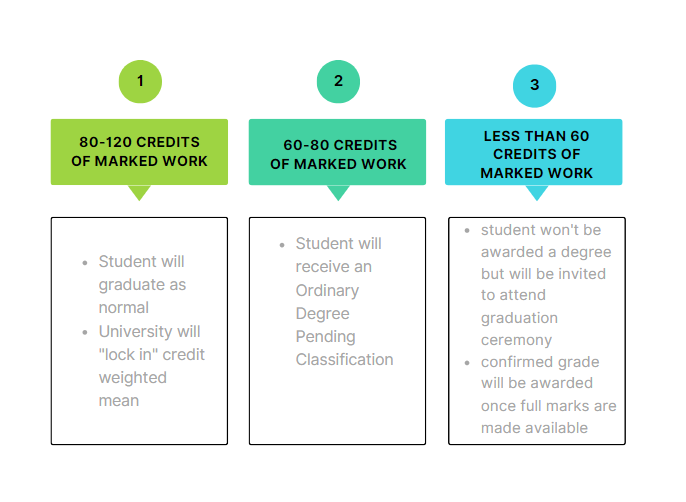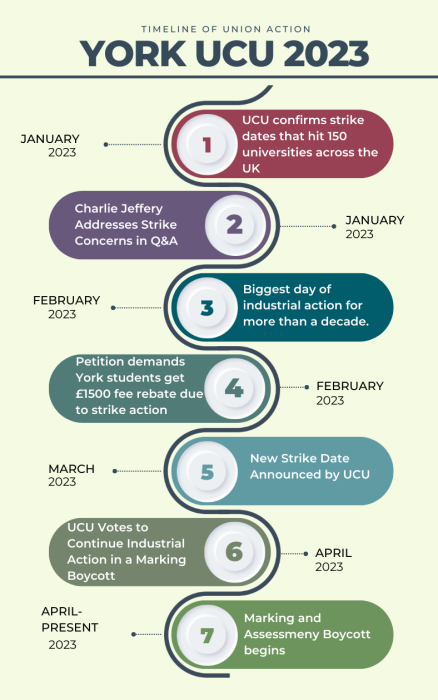Class of 2023 could be graduating without a degree classification.
The University of York’s branch of the University and College Union (UCU) are joining 144 other UK universities by participating in a Marking and Assessment Boycott (MAB), which has been in place since 20th April.
During the MAB, teaching staff will not undertake any marking or assessment-related activities as part of an ongoing dispute over working conditions. The MAB is not scheduled to end until 20th October, though the Union can vote to extend this if they do not reach a solution.
This means that a substantial portion of work submitted from the beginning of summer term will not be marked until the boycott comes to an end, after most final year students will have already graduated. This means that lots of students’ dissertations are not getting marked.
The University has responded by taking significant pay deductions of 50% from participating staff member’s payslips.
In an open letter to third year English students, UCU members of the Department of English and Related literature spoke of the University “dismantling quality assurance procedures and checks on academic standards” in their response to the MAB.
Members of the UCU have also urged students to write to the Vice Chancellor, expressing their dissatisfaction with the way negotiations are being dealt with.

The University is clear that graduation ceremonies will take place on the advertised dates. However, many students will not have enough marked work for the University to make decisions about their graduation or progression.
Students normally need 120 credits per year to progress to the next stage. To minimise impact of the marking boycott, the University has said that students with 80 marked credits will graduate as normal. For students in this position, the University will lock in credit weighted mean and will make decision about progression or degree classification.
For students with 60 credits marked, an ordinary degree will be awarded with a letter explaining the situation. An honours degree will only be awarded once the student has received a full set of grades.
In the worst-case scenario, students who have less than 60 credits marked won’t be awarded a degree. These students will still be invited to graduation, receiving their confirmed grade once marks are awarded.
Last term, students faced more disruptions to learning than ever before due to repeated cycles of strike action. Many lectures, seminars, and workshops did not go ahead, meaning that students missed out on essential course material.
As students of the GCSE reform and the 2020 A-Level algorithm, this year group has already faced huge disruptions to their education. Most students graduating this year had their A-Levels disrupted because of the pandemic. The marking boycott places them in similar position for their degree.
The very limited amount of communication from the University means that students are confused about what this means for them. Many students are waiting on marks from modules that had teaching badly impacted by latest union action. This raises fears surrounding earning places on postgraduate courses, the majority of which require a 2:1 for entry.

The MAB’s impact on international students is a particular concern, who make up over 14 percent of the population on campus.
Hesandi, an international student at the University said:
“As a student studying English, it’s a no brainer to support the strikes especially since our tutors are not getting compensation for their hard work. As an international student, the University’s decisions to not support our tutors hits us very hard – our visas depend on our progression from one year to another, and applying for the graduate visa depends on us actually receiving our marks.”
Student X spoke of fears for international students not being able to start their studies in their home country and the anxiety they faced while waiting on confirmation of their postgraduate study.
“To study in my country I’d meet to nostrify my diploma at the Ministry of Education. That process is already long. And without a diploma, I would not have enough time to do it, so I wouldn’t be able to study at all!
“I was not however angry at professors but at the University for treating their staff so badly that they have to strike. I still fully support them.”
This time of year is already a challenging time for final-year students, but now many are graduating with a feeling of dissatisfaction from their time at university. In the meantime, many wait in hope that the disputes will be resolved in time for them to graduate.
For more information on the Marking and Assessment Boycott, read the University’s industrial action web page here.
